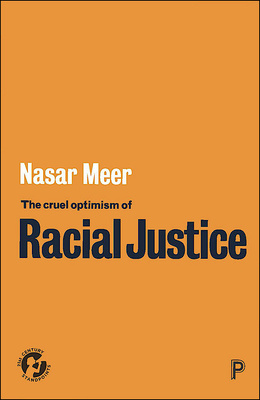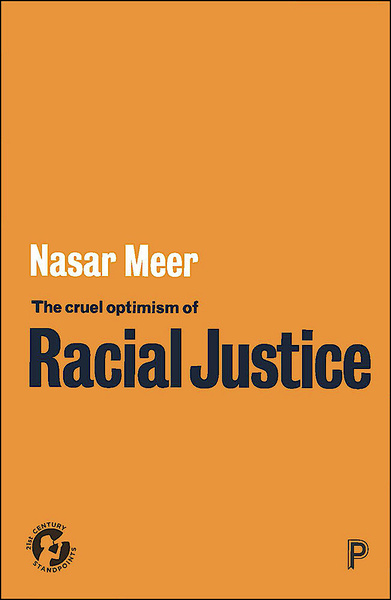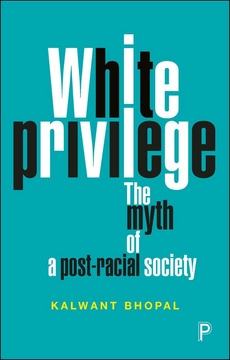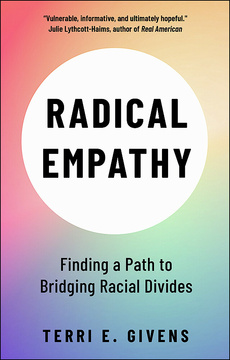The Cruel Optimism of Racial Justice
By Nasar Meer
ISBN
978-1447363026Dimensions
216 x 138 mmImprint
Policy PressISBN
978-1447363033Dimensions
216 x 138 mmImprint
Policy PressISBN
978-1447363033Dimensions
216 x 138 mmImprint
Policy PressIn the media
Reorienting from ‘crisis ordinariness’: a meditation on The Cruel Optimism of Racial Justice in RACE.ED
'In the fight for racial justice, optimism is not enough' in OpenDemocracy
'The Cruel Optimism of Racial Justice' in New Books Network podcast
On our blog: What is the state of racial justice in Britain today?
On our blog: PODCAST: Why racial justice will always need activists
What can we learn from successes and failures in the pursuit of racial justice in the UK and elsewhere in the Global North?
A dominant view of racial justice has long been linked to a ‘cruel optimism’ which normalises social and political outcomes that sustain racial injustice, despite successive governments wielding the means to address it. Researchers, activists and minoritised groups continually identify the drivers of these outcomes, but have grown accustomed to persevering despite strong resistance to change.
Looking at numerous examples across anti-racist movements and key developments in nationhood/nationalism, institutional racism, migration, white supremacy and the disparities of COVID-19, Nasar Meer argues for the need to move on from perpetual crisis in racial justice to a turning point that might herald a change to deep-seated systems of racism.
“Timely and insightful, provides not only a clear mapping of our current context with regard to racial justice, what has been achieved, what has been obscured and what has failed, but also what can be done. An essential read in the current reactionary conjuncture and provides us with ways in which to think about our past, present and future in more hopeful and just terms.” Aurelien Mondon, University of Bath
"Nasar Meer asks a thought-provoking foundational question: What if racial justice movements are destined to fail because racial injustice is part of the DNA of our social institutions? He argues convincingly that only by looking at these deep roots will we understand why racial injustices prevail even after generations of anti-racism struggles. […] His deeply scholarly yet based-in-practice account is a compelling wake-up call to rethink what “progress” actually looks like and whose interests it serves." Peggy Levitt, Wellesley College
“For those scholar activists, community organisers, freedom dreamers and everyday people living the political and emotional struggle against racial injustice, this is a book for you. Not only does Nasar Meer name the cruel optimism that keeps us looking toward alternative futures in the midst of the persistence of systemic and intractable forms of injustice, but this book offers a sobering reflection on how reckoning with what has not yet come to pass can in fact provide a renewed sense of hope in what might be.” Kennetta Hammond-Perry, Stephen Lawrence Research Centre, De Montfort University
Nasar Meer weaves together an impressive account, drawing on research in a number of national contexts, to address the question of why there has been a failure to achieve the objective of racial justice. This masterful account should become an important part of future conversations by researchers and policymakers about how we can lay the foundations for radical change in this vital area of the social world." John Solomos, University of Warwick
"A crucial analysis of what we can learn from various attempts at racial justice throughout the Global North. An accomplished scholar of race, ethnicity, and nationalism, Meer’s thorough and beautifully crafted text provides a needed guide for making sense of our present moment – and its historical antecedents – as both the BlackLivesMatter movement and the global pandemic intensify." Jean Beaman, University of California, Santa Barbara
"Nasar Meer enjoins us to reckon with the systemic character of racial injustice, the imprint of the past on the present and our compulsion to optimism in the face of the repeated failure of ameliorative initiatives. Alive to the moral, affective and political dimensions of its subject, this is essential reading for anyone who wants to understand the conditions which produce racial injustice and to imagine those which will allow the justified perseverance of hope." David Feldman, Birkbeck, University of London
"Asks profound questions about how struggles for racial justice come to reach their impasse through counter-reactions designed to preserve existing racial orders and formations. Meer's book not only offers an illuminating analysis of the present conjuncture, but also the challenge of thinking through the concepts of racial justice and equality." Sindre Bangstad, KIFO, Institute for Church, Religion and Worldview Research, Norway
"Essential reading for anyone seeking a deeper understanding of structural racism and how it persists, despite waves of policy and political intervention." Carol Young, CRER
Nasar Meer is Professor of Race, Identity and Citizenship in the School of Social and Political Sciences at the University of Edinburgh, UK
1. The Cruel Optimism of Racial Justice
2. Reimagining Nationhood?
3. Equality, Inequalities and Institutional Racism
4. The Racial Realities of COVID-19
5. (De-)racialising Refuge
6. Whiteness and the Wreckage of Racialisation
7. Rethinking the Future: Affect, Orders and Systems













